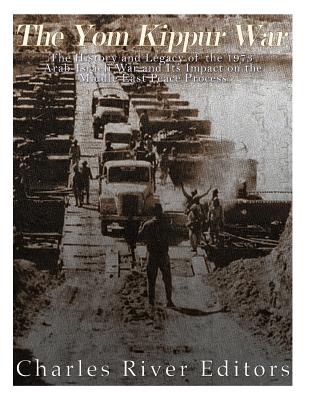The Yom Kippur War: The History and Legacy of the 1973 Arab-Israeli War and Its Impact on the Middle East Peace Process

The Yom Kippur War: The History and Legacy of the 1973 Arab-Israeli War and Its Impact on the Middle East Peace Process
*Includes accounts of the fighting
*Includes online resources and a bibliography for further reading
"War is not an independent phenomenon, but the continuation of politics by different means." - Carl von Clausewitz, On War
In May 2011, President Barack Obama gave speeches about the Middle East that discussed the Israeli-Palestinian conflict, using terms like "final status issues," "1967 lines with mutually agreed swaps," and "demographic realities." Obama's speeches were strongly denounced by both the Palestinians and the Israelis, while political commentators across the world debated what Obama's speeches actually meant.
Welcome to the Middle East conflict, a conflict that is technically 63 years old and counting but has its roots in over 2,000 years of history. With so much time and history, the peace process has become laden with unique, politically sensitive concepts like the right of return, contiguous borders, secure borders, demilitarized zones, and security requirements, with players like the Quartet, Palestinian Authority, Fatah, Hamas, the Arab League and Israel. Over time, it has become exceedingly difficult for even sophisticated political pundits and followers to keep track of it all.
On October 6, 1973, Syria and Egypt caught Israel off guard during the Jewish holy holiday of Yom Kippur, surprise attacking the Sinai Peninsula and Golan Heights. Although they initially made gains, the Israelis turned the tide within a week, going on the counteroffensive and winning the war within 3 weeks.
The Yom Kippur War was the last concerted invasion of Israel by conventional Arab armies, but it underscored how entangled the West and the Soviet Union had gotten in the region. The British and French had been allied with Israel in the 1950s, including during the Suez Canal War, and the United States assisted Israel by providing weapons as early as the 1960s. As a way of counteracting Western influence, the Soviets developed ties with the Arab nations.
After the Yom Kippur War, President Jimmy Carter's administration sought to establish a peace process that would settle the conflict in the Middle East, while also reducing Soviet influence in the region. On September 17, 1978, after secret negotiations at the presidential retreat Camp David, Egyptian President Anwar Sadat and Israeli Prime Minister Menachem Begin signed a peace treaty between the two nations, in which Israel ceded the Sinai Peninsula
PRP: 86.34 Lei
Acesta este Prețul Recomandat de Producător. Prețul de vânzare al produsului este afișat mai jos.
69.07Lei
69.07Lei
86.34 LeiIndisponibil
Descrierea produsului
*Includes accounts of the fighting
*Includes online resources and a bibliography for further reading
"War is not an independent phenomenon, but the continuation of politics by different means." - Carl von Clausewitz, On War
In May 2011, President Barack Obama gave speeches about the Middle East that discussed the Israeli-Palestinian conflict, using terms like "final status issues," "1967 lines with mutually agreed swaps," and "demographic realities." Obama's speeches were strongly denounced by both the Palestinians and the Israelis, while political commentators across the world debated what Obama's speeches actually meant.
Welcome to the Middle East conflict, a conflict that is technically 63 years old and counting but has its roots in over 2,000 years of history. With so much time and history, the peace process has become laden with unique, politically sensitive concepts like the right of return, contiguous borders, secure borders, demilitarized zones, and security requirements, with players like the Quartet, Palestinian Authority, Fatah, Hamas, the Arab League and Israel. Over time, it has become exceedingly difficult for even sophisticated political pundits and followers to keep track of it all.
On October 6, 1973, Syria and Egypt caught Israel off guard during the Jewish holy holiday of Yom Kippur, surprise attacking the Sinai Peninsula and Golan Heights. Although they initially made gains, the Israelis turned the tide within a week, going on the counteroffensive and winning the war within 3 weeks.
The Yom Kippur War was the last concerted invasion of Israel by conventional Arab armies, but it underscored how entangled the West and the Soviet Union had gotten in the region. The British and French had been allied with Israel in the 1950s, including during the Suez Canal War, and the United States assisted Israel by providing weapons as early as the 1960s. As a way of counteracting Western influence, the Soviets developed ties with the Arab nations.
After the Yom Kippur War, President Jimmy Carter's administration sought to establish a peace process that would settle the conflict in the Middle East, while also reducing Soviet influence in the region. On September 17, 1978, after secret negotiations at the presidential retreat Camp David, Egyptian President Anwar Sadat and Israeli Prime Minister Menachem Begin signed a peace treaty between the two nations, in which Israel ceded the Sinai Peninsula
Detaliile produsului









